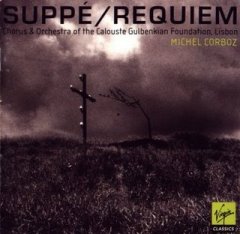Franz Von Suppe – Requiem (2003)
Franz Von Suppe – Requiem (2003)

01. Requiem Aeternam 02. Dies Irae 03. Tuba Mirum 04. Rex Tremendae 05. Recordare 06. Confutatis 07. Lacrimosa 08. Domine Jesu Christe 09. Hostias 10. Sanctus 11. Benedictus 12. Agnus Dei 13. Dies Irae Elisabete Matos - Soprano Mirjam Kalin - Contralto Aquiles Machado - Tenor Luis Rodrigues - Bass Chorus and Orchestra of the Calouste Gulbenkian Foundation Michel Corboz – conductor
The Dalmatia-born Franz von Suppé found great fame for his operettas. It seems that Suppé was given assistance in Vienna by Donizetti who was a distant relative. Today he is most likely to be encountered through overtures and marches such as Light Cavalry, O du mein Österreich, Beautiful Galatea, Morning, Noon, and Night in Vienna and Poet and Peasant. Suppé did write in other genres and composed a small number of sacred works including this Requiem in D minor. It is certainly neglected and if I was aware that he had written a requiem I had forgotten. A check has revealed that there are one or two recordings of the Requiem but I have not heard them.
The Requiem in D minor for soloists, choir and orchestra or the Missa pro defunctis (Mass for the dead) to give it its official title was completed in 1855, a product of the composer’s mid-thirties. Suppé wrote it in memory of his patron and friend, the theatre director Franz Pokorny who had died in 1850. In addition the score bears a dedication to ‘His Holiness, Pope Pius IX’. The fact that the dedication was accepted by the pontiff should serve as evidence of the score’s liturgical suitability. When the Requiem was introduced in 1855 at the Josefstadt Piaristenkirche, Vienna it was initially well received. Later it became labelled too ‘Italianate’, not containing enough of the solemn character of the more conventional requiem. It seems that the score was lost following a performance in Vienna in 1901 and only rediscovered in 1988 in a Vienna library. The score requests four soloists: soprano, alto, tenor and bass and a divided choir of at least 64 singers which can be doubled. The celebratory nature of the scoring which was rather lavish for its time specifies 24 violins, 8 violas, 6 cellos, 6 basses, double woodwind, 4 horns, 2 trumpets, 3 trombones and kettle-drums. It is cast in thirteen parts including the Dies irae which is subdivided into six sections. --- Michael Cookson , musicweb-international.com
download: uploaded yandex 4shared mediafire solidfiles mega zalivalka filecloudio anonfiles oboom
Last Updated (Tuesday, 20 May 2014 21:19)








